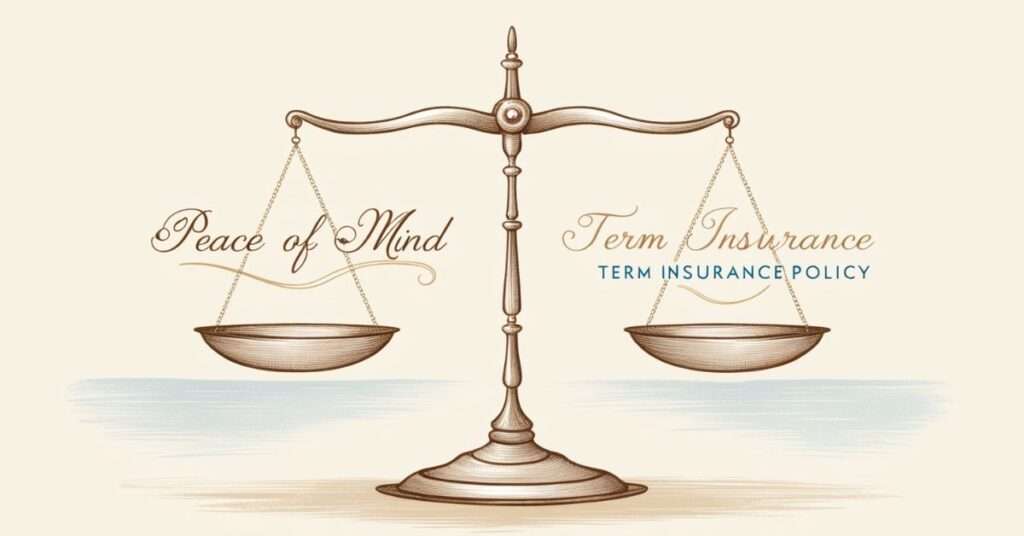Table of Contents

In Indian families where multiple generations are dependent on a single breadwinner, term insurance isn’t just any other financial product. It provides financial assistance to your family in your absence. In the event of an unfortunately death of the insured person, it provides a safety net for a his/her family. It’s a promise that your family’s financial future will remain secure, regardless of uncertainties.
In this article we will discuss its key features, benefits and why it should be a part of your financial planning. Whether you are a young professional, a new parent, or you are planning for retirement, you should know the significance of term insurance.
Key features
- Pure Life Coverage: Term insurance provides death benefit only. It doesn’t have any savings or investment component. Here policy holders pay premiums to secure a predefined amount their beneficiaries in case of his/her death during the policy term.
- Fixed Tenure: Policies are available for specific tenures e.g. 10, 20, 30 years etc. You can choose the policy tenure based on your finanial goals and family needs.
- High sum assured & Low premiums: Term Insurances is the most affordable form of life insurance with high sum assured. This makes it accessible for individuals across different income groups. Premiums usually remain constant throughout policy term.
- Riders available: You can avail additional benefits such as critical illness cover, accidental death benefit to enhance the policy coverage. You can customize the policy according to your needs.
- Renewability: Many policis offer the option to renew the policy at the end of term. But renewability usually comes with higher premiums due to increase of age.
- Tax benefits: You can get tax benefits for premiums paid towaredes term life insurance under section 80C of the Income Tax Act,1961, and the death benefit is tax-free under section 10(10D)

Why Term Life Inusrance is Important for Indian Families?
- Financial Security: Many Indian households rely on a single income earner. Term Insurance ensures financial stability of the family in case of policyholder/breadwinner’s death. This can ensure the family can maintain their standard of living.
- Debt Repayments: Now a days many Indian families have different type of loans (e.g. home loans, personal loans, educational loans). Term insurance can cover these outstanding debts, preventing the burden falling on surviving family members. Term insurance can also cover potential health care debts as Medical/hospital expenses have risen a lot.
- Education Expenses: Higher education costs in India are significant and rising. Term insurance benefit can be used to fund children’s education.
- Marriage expenses: Wedding costs in India can be significant. Term insurance benefit can cover funds needed for children’s marriages.
- Rising cost of living: Urban areas in India is experiencing rapid inflation. With high coverage amounts term insurance can help maintain the family’s standard of living despite rising costs. If you want to know about different ways you can beat inflation in India, you can click on this link.
- Support for aging parents: Many working adults support their elderly parents. Term insurance benefit can ensure this support continues even after policy holder’s death.
Factors to consider before choosing Term Insurance
- Coverage Amount: First you need to assess your family’s financial needs, including daily expenses, children’s education costs etc. Then consider your future expenses connecting to your future goals and add inflation over your current expenses to determin the appropriate coverage amount. Typically recommended to be 10-15 times your annual income.
- Policy Tenure: It is best to choose a term that covers your working years or major financial obligations like children’s educations, their marriages, loan repayments etc. And also consider your retirement age and and the duration for which your family will be financially dependent on you.
- Premiums: Compare premiums across insurers for the same coverage amount over long term. Make sure that you choose the premium amount such that it does not affect on your other investments goals.
- Insurer’s Reputation: Check the insurer’s claim settlement ratio and Amount settlement ratio. Claim settlement ratio shows the percent of claims the insurer has settled and Amount settlement ratio shows out of total claim amount how much percent of claims have been settled. This tells you how effectively companies are settling claims. Also research about company’s customer service. Here you can find Amount settlement ratio of different companies.
- Additional Riders: Evaluate the available riders and add-ons like critical illness, accidental benefit etc. Determine if available riders are value for money or not.
- Policy Terms and Conditions: Read the policy term & conditions carefully and find out the exclusions and waiting period. Also understand the condition for policy lapse and revival.
Calculate the right coverage amount
Calculating the coverage amount for term insurance is crucial to ensure your family’s financial security. Obviously, there is no accurate answer to it. But you can calculate the amount in a few different way and then choose what would be right amount for you.
- Human Life Value(HLV) method: In this method calculate your annual income. Multiply it by the number of working year left. Factor in an annual inflation rate (typically 6-7% in India). Formula: Annual Income x (1+ Inflation rate/100)^Years till retirement
- Income replacement method: Determine how many years of income you want ot replace. Multiply your current annual income by this number. For example, if your annual income is 10 lakhs annually and want to replace 15 years of income, the coverage would be 1.5 crore.
- Expense Method: Calculate your family’s annual expenses. Multiply by the number of years you want to cover. Add major future expenses like children’s education, marriage etc. Factor in any other significant family goals.
- Debts and Liabilities: Sum up all your existing outstanding loans and debts such as home loans, personal loans, credit card debt etc. Also include any potential future loans, for example education loan.
- Subtract Existing Investments and Assets: Calculate the current value of your investments and assets, such as savings, FD, Mutual Funds etc. Substract it from your total calculated needs. Also substract any existing life insurance coverage.
- Emergency Fund: You can also include an amount for emergencies (typically 6-12 months of expense)
- Rule of thumb: As a quick estimate aim for 10-15 times of your annual income.
Tax Benefit in India
- Section 80C: Premiums paid for term insurance policies are eligible for tax deductions upto 1.5 lakh rupees under section 80C of the Income Tax. This deduction limit is shared with other tax saving instruments like PPF, ELSS etc. Important point to Note:
- To claim the benefits, the annual premiums should not exceed 10% of the sum assured.
- GST paid on premiums is not paid eligible for tax deduction.
- Tax benefits are subject to changes in Finance budget
- Section 10(10D): The sum assured received by the nominee is completely tax free. This is applicable to all term insurance policies.
Common myths regarding Term Insurances
There are several common myths about term insurance policies in India that often lead to misunderstanding. Here are some of the common myths:
- Myth- “Term Insurance is not beneficial as it doesn’t offer returns”, Reality- Primary purpose of term insurance is protection of beneficiary, not investment return.
- Myth- “I don’t need term insurance if I am young and healthy”, Reality- Young age is actually the best time to buy term insurance as premiums increase as you get older.
- Myth- “Term insurance is expensive”, Reality- It is actually the most affordable type of insurance.
- Myth- “I can’t get term insurance if I have health issues”, Reality- Many company offer term insurance to managed health conditions. But Health condition affects premiums. For healthier people premium is lower.
- Myth-”Smokers can’t get term insurance”, Reality- Smokers can get term insurance, although at higher premiums.
Tips for ensuring smooth claim settlement
- Choose a Reputable Insurer:
- Select an insurance company with high Amount settlement ratio. It is not as same as claim settlement ratio. Amount settlement ratio tells how well a company is settling claims.
- Research the insurer’s reputation for customer service and claim process.
- Provide accurate information:
- Be honest and thorough when filling out the application. Disclose all relevant medical history and lifestyle information accurately. keep in mind that Inaccurate information can lead to claim rejection.
- Ensure all documents provided are complete and authentic.
- Understand Policy term and conditions
- Understand what circumstances might lead to claim rejection.
- Understand what is covered and what is excluded in the term policy.
- Regular Premium Payments
- Ensure the policy remains active by paying premiums on time.
- Set up auto debit or reminders to avoid policy lapse.
- Informe nominee
- Inform your nominee about the term insurance’s existence.
- Provide them the basic details like policy number and insurer’s contact number.
- Keep Policy details safe
- Store policy documents in a secure, easily accessible location.
- Keep digital copies and inform family members of their location.
FAQ
- What is term Insurance?
- Ans- Term insurance is a type of life insurance policy that only provides death benefits for a specific period.
- How is term insurance different from other types of life insurance?
- Ans- The Main difference between term insurance and other insurance is term insurance prodives pure life coverage without any investment component. It is also more affordable than whole life insurance policies.
- At what age should I buy term insurance?
- Ans- It’s best to buy term insurance as early as possible, ideally in your 20s or early 30s. The earlier you buy term insurance, lower the premiums will be.
- How much coverage do I need?
- Ans- Generally, 10-15 times your annual income is recommended. But you should also take account for your debts and future goals like children’s education and marriage.
- What happens of I outlive my term insurance policy?
- Ans- If you outlive your policy, the coverage will end and you won’t receive any benefits. Sometimes there are options to renew the policy.
- Can I get term insurance if I have a pre-existing medical condition?
- Ans- Yes, but it may affect your premium or require aditional medical tests. Some conditions might lead to rejection.
- How does smoking affect term insurance?
- Ans- Smokers generally pay higher premiums due to increased health risks. Disclose your smoking habits honestly or it may lead to claim rejection in future.